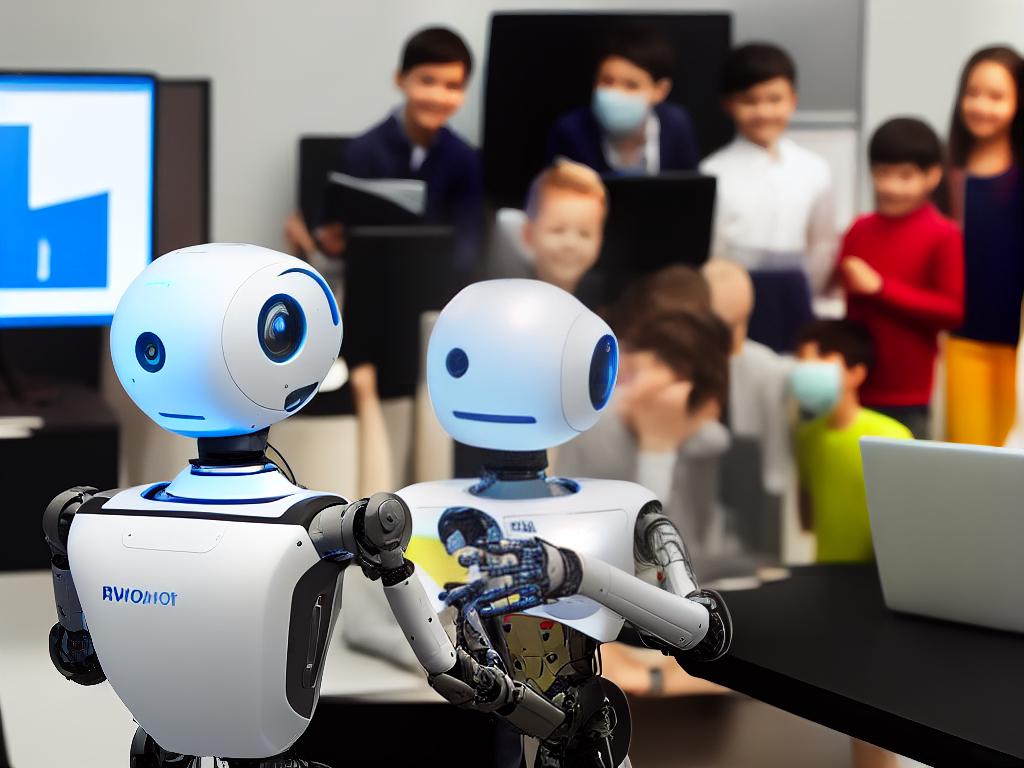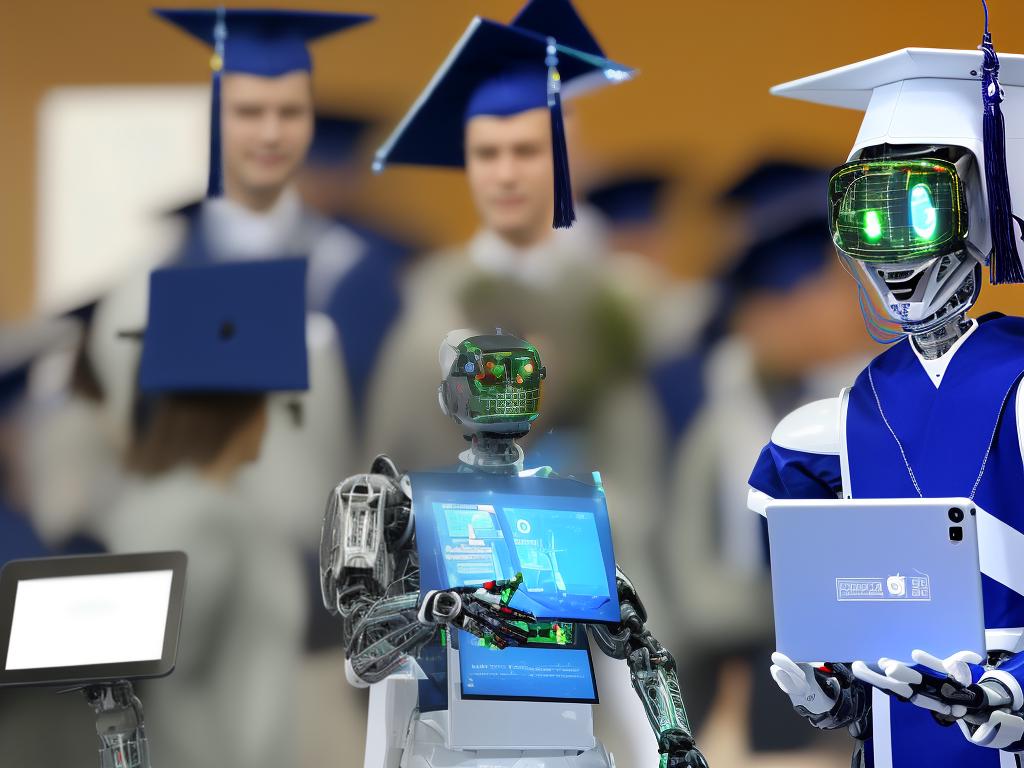Unveiling the Future: AI-Enabled Education
In the dynamic landscape of education, advances in technology continually shape the methodologies of teaching and learning.
Among the most transformative innovations is Artificial Intelligence (AI) – not so much a tool, but a phenomenon that’s significantly altering the academic framework.
Understanding the relationship between AI and education is essential as we navigate this new landscape, identify its potential benefits, and tackle its challenges.
In a world where technology pervades every facet of life, we explore the transformative power of AI in education – from its workings to its integration into educational systems, its benefits and limitations, and its progressively successful implementation.
Understanding AI in Education
Understanding AI and its Relevance in Education
Education has experienced a significant evolution with the advent of technology, and the integration of Artificial Intelligence (AI) is a significant part of this transformation.
AI, in its simplest definition, is the development of computer systems capable of performing tasks that would normally require human intellect.
These tasks could range from visual perception and speech recognition to decision-making and translation. AI has the potential to revolutionise the education sector, providing personalized and effective learning experiences.
AI involves programming computers to imitate human intelligence. This technology continually learns and adapts, improving its performance with the availability of new data or experiences.
The core elements of AI include Machine Learning (ML), which enables the system to autonomously learn from data, and Deep Learning, a subset of ML that uses neural networks with several layers of artificial neurons to decipher intricate patterns from vast amounts of data.
Integration of AI in Education Systems
Several AI-enabled tools are already being integrated into learning environments.
For instance, Intelligent Tutoring Systems (ITS) are AI systems that offer a level of personalised guidance akin to a human tutor.
ITSs provide immediate and customised feedback to students, analysis of a learner’s responses, and adapted problems and instruction to address the learner’s needs.
AI is also facilitating the teaching of challenging subjects, such as STEM (Science, Technology, Engineering, Mathematics).
Difficult concepts can often be better illustrated with immersive experiences, something AI can provide by enabling virtual and augmented reality applications.
Moreover, educational data mining and learning analytics are being used to predict student performance and prevent school dropouts. Analytics can highlight patterns and trends in students’ performance, providing valuable insights to develop strategies that facilitate academic success.
AI-driven chatbots and smart speaker systems, on the other hand, can communicate with students and provide assistance outside classroom hours.
These technologies can answer academic queries and aid in supporting students with their mental health by providing continuous emotional support and guidance.
Exploring AI’s Prospective Contribution to Education
While the integration of Artificial Intelligence (AI) in education is still in its formative stages, the boundless potential of its application is yet to be fully explored.
As we continue to advance in AI technology, it is expected to significantly influence the educational methodologies of the future. For instance, data generated from AI systems could potentially inform educational policies and machine learning could assist in constructing more effective curriculums.
Nonetheless, AI’s inclusion in education also implies certain ethical implications. It is necessary to contemplate issues such as privacy, security, accessibility, and the prospect of diminishing human interaction in the realm of learning.
Adequate measures and policies need to be in place to ensure the responsible use of AI and equitable access for every learner.
There is no doubt that the range of possibilities offered by AI in education is considerable. With its propitious ability to customise learning experiences, heighten administrative efficacy, predict student outcomes, and offer support continuously, the future of education could be significantly determined by AI.
It is however, vital that careful management is administered in its application so that maximum benefits can be achieved while risks are conscientiously minimised.
The transformative potential of AI in education is immense, but it requires judicious, considerate and fair use for this potential to be fully realised.
Benefits of AI in Education
As we traverse this epoch of intense digital metamorphosis, it becomes crucial to harness the potential of AI in effecting radical changes in educational practices. With its transformative capabilities, AI is rewriting the traditional norms of teaching and learning, resulting in substantial benefits for both educators and students.
Personalised Learning Experiences
Traditionally, the ‘one size fits all’ approach has been a cornerstone of educational systems around the globe for years. This practice often overlooks the individual learning pace and interests of each student.
Personalised learning is arguably the most pivotal benefit of AI in education. AI-based education tools can tailor educational content to meet the exact needs of every student, factoring in their learning style, speed, and level of understanding.
A good example can be drawn from the USA where a software called ‘Smart Sparrow’ is being utilised.
This AI-based platform adapts the coursework based on a student’s performance and understanding, ensuring that no one is left behind.
These tools significantly enhance student engagement, offer personalised tutoring, and promote individual growth and development.
Identifying Student Needs and Progression
AI holds out the promise of identifying student needs and tracking their progression.
AI algorithms can assess student performance and skill levels through regular evaluations, making it possible for the teachers and the system itself to understand the unique needs and knowledge gaps of the students.
They can then tailor the teaching methods and curricular activities accordingly to fit those specific needs.
A striking example is the use of Carnegie Learning’s MATHia platform in some American schools.
MATHia uses AI to track students’ mastery of different maths skills and presents customised learning modules based on their individual needs.
This method not only enables students to learn at their own pace but also helps educators to understand student capabilities better.
Automation of Administrative Tasks
AI can greatly assist in automating various administrative tasks for teachers, which in many cases is a time-consuming process.
Tasks like grading homework, evaluating essays, and responding to student inquiries can be comfortably handled by AI, freeing up more time for teachers to focus on teaching and mentoring students.
Consider the case of Jill Watson, an AI teaching assistant developed at Georgia Tech University.
Jill answers student inquiries with such accuracy that the students could not distinguish her from a human teacher.
The implementation of AI-powered tools like this reduces the workload of teachers and allows for a more efficient teaching-learning process.
Key point
The embedding of AI into the education sector is orchestrating a more versatile, bespoke, and streamlined learning arena. The potential of enabling personalised learning, recognising individual student needs and development, and computerising administrative duties could significantly enhance the inclusivity and efficacy of the educational setting.
As we increasingly welcome AI into education, it becomes clear that we are on the brink of an exciting and revolutionary change in the way we teach and learn. It is crucial to persist in our research and investment into AI-enabled education to ensure the best possible outcomes for the learning advancement of future generations.
Challenges and Limitations with AI in Education
Appreciating the significant role of artificial intelligence (AI) in shaping education calls for a well-rounded perspective. While there are unquestionably immense benefits to mull over, it is also paramount to acknowledge the inherent challenges and constraints. Incorporating AI into the realm of education isn’t without its intricacies, ranging from technical and financial aspects to ethical and privacy-related concerns.
Technical Limitations
One of the foremost challenges lies in the technical aspect. AI in education often demands a robust technological infrastructure, including high-speed internet, advanced hardware, and sophisticated software.
Unfortunately, not all educational institutions, particularly those in rural or disadvantaged regions, have access to such resources.
Even if the institution can afford the technology, they may lack the technical know-how to properly deploy and maintain it.
This disparity could widen the digital divide between different schools and among students, leading to unequal access to AI-enabled education.
Additionally, the current state of AI is not as advanced as some might believe. Although AI can streamline administrative tasks and provide supplemental learning help, it cannot yet replace the nuanced and complex role of a human teacher.
AI struggles with tasks involving abstract thinking, creativity, and emotional intelligence – qualities integral to effective teaching and learning.
Financial Challenges
The financial implications of AI-enabled education also pose challenges.
Implementing AI into learning environments requires significant investment in the procurement of advanced technologies, staff training, and ongoing maintenance.
Despite the potential long-term savings AI might provide, the initial financial outlay may put it out of reach for many schools with budget constraints.
Ethical and Privacy Concerns
Another primary concern revolves around ethical and privacy issues. By nature, AI systems collect and process vast amounts of data. In the case of AI in education, this data relates primarily to students’ personal and academic information.
This raises serious privacy concerns. There’s also the potential risk of data misuse or breaches, which could infringe on students’ privacy rights and expose them to unknown vulnerabilities.
On an ethical level, there are concerns about fairness and bias in AI systems. Algorithms can inadvertently perpetuate social biases lacquered in data, resulting in discriminatory effects.
For instance, if the AI software is biased in the way it assesses or interacts with students, it could unfairly affect their educational outcomes. We must also grapple with the question of utilizing AI to replace teachers partially or entirely, and the implications this carries for human employment.
key point
The adoption of AI in education brings forth an exhilarating new chapter in pedagogy. It enables heightened efficiency in administrative operations, offers a personalised learning journey for students, and increases the accessibility of educational materials.
Despite its numerous benefits, challenges such as technical and financial barriers, ethical and privacy issues present unavoidable obstacles to widespread acceptance. Consequently, it is critical to perceive AI as a complement to conventional teaching techniques rather than a substitute.
Any incorporation of AI into the education system must be executed judiciously and inclusively, taking into account all potential impacts and implications.
Case Studies of Successful AI Implementation in Education
Artificial Intelligence in the Education Sector
The wave of Artificial Intelligence (AI) has brought about revolutionary changes across various sectors, with education being no exception.
The assimilation of AI in teaching institutions has significantly redefined the educational landscape. It facilitates tailored learning pathways, boosts student engagement, and enhances operational efficiency.
In this article, we will explore several examples that further emphasise the successful integration and remarkable outcomes of utilising AI in education.
Case Study 1: Century Tech
Century Tech has made an indelible mark when it comes to the adoption of AI in education.
This London-based learning platform uses AI to create a personalised learning experience for students. The sophisticated AI algorithm assesses a student’s strengths, weaknesses, and learning style, crafting tailored learning paths and resources to meet these personal needs.
This process enhances individualised teaching and learning, making it easy for educators to monitor student progress and intervene whenever necessary.
This technology has been incorporated into several UK schools and has contributed to improved instructional quality and student outcomes.
Case Study 2: Content Technologies Inc.
On the other side of the Atlantic, Content Technologies Inc., a US-based AI educational company, has been turning heads with its advanced learning solutions. The company uses AI to transform traditional textbooks into engaging learning experiences.
By leveraging AI, the content is transformed into multiple formats, including gamified content, flashcards, summaries, practice tests, and even chatbots for interactive learning.
This approach has resulted in enriched learning content and improved student interaction with study materials, facilitating a greater comprehension and retention of knowledge.
Case Study 3: Deakin University
Down under in Australia, Deakin University has leveraged AI to enhance student experience and engagement.
The university employs the use of an AI-driven digital assistant known as ‘Genie’. This virtual assistant aids students in effectively managing their studies by recommending personalised timetables, study tips, due reminders and information sessions.
This innovative strategy has increased student engagement, satisfaction, and academic performance.
Case Study 4: Carnegie Learning
Carnegie Learning is a US-based online learning platform that integrates AI into its teaching approach.
With MATHia, their AI-based system, learners receive personalised instructions in real-time, which adapt to their capabilities and knowledge level while giving educators vital data on each student’s progress.
This has significantly improved the effectiveness and efficiency of mathematics education, promoting a deeper understanding of mathematical concepts among students.
Case Study 5: University of the People
The University of the People, a California-based institution, provides an AI-driven mentorship programme. The AI algorithm matches students and mentors based on common traits and interests.
This advanced approach facilitates meaningful and mutually beneficial relationships, enhancing the overall student experience.
Key point
AI boasts vast promise for the field of education, showcased by the remarkable successes achieved by various establishments.
Whether it’s customising educational material, reshaping conventional content, or aiding the building of effective relationships, there’s no denying the transformative impact AI has had on education.
Consequently, it has become crucial for more institutions to investigate the advantages these technologies offer to structure enriched learning experiences, and ultimately, enhance the achievements of students worldwide.
The Future of AI-Enabled Education
AI-facilitated education, sometimes referred to as educational technology or e-learning, is an emerging domain with the potential to revolutionise learning. This innovative teaching practice is poised to completely restructure our learning approach by fusing highly advanced technologies such as AI, Machine Learning (ML), and Deep Learning into educational techniques.
These groundbreaking technologies extend beyond simply changing how content is delivered, they fundamentally alter how students interact with the material and their educators.
Predictions for the Future of AI in Education
Many forecasts highlight the growing significance of AI in reshaping education in the coming years. Personalised learning, one key development, employs AI algorithms to tailor learning materials to an individual student’s strengths, weaknesses, and learning pace.
This individual focus promises better engagement and understanding, providing a unique learning journey for each student.
AI is also set to revolutionise assessment processes. Innovative solutions such as automated essay grading systems are expected to gain more acceptance.
These tools use machine learning to grade student essays accurately, which saves teachers time and ensures a non-biased assessment. Additionally, AI technology is being harnessed to develop advanced plagiarism checkers that can detect copied content with high precision, reinforcing academic integrity.
Potential Impacts of AI on Education
The integration of AI in education opens a plethora of possibilities. On one hand, it can shorten the learning curve by accommodating individual learning styles and paces.
This kind of flexible, customisable learning environment can usher in a much-needed revolution in the standard one-size-fits-all approach of current education systems.
On the other hand, AI is also seen as a tool to bridge the gap between standardized education and skill-oriented learning.
AI-based career advising systems can help students to choose courses that align with their future career goals, preparing the workforce of tomorrow.
However, this AI transition also invites some concerns. Issues around data privacy: how students’ data is used and stored, and the digital divide: unequal access to technology, predominantly in underdeveloped regions and poor urban areas, are high on the list.
How Institutions can Prepare for AI Advancements
Institutions need a measured approach to successfully incorporate AI into education. Firstly, they must invest in the necessary infrastructure and upskilling teachers for the digital transition.
Knowing how to use technology effectively is as important as having it. A process of continuous training can help educators to keep up with evolving AI tools and to apply these technologies in their teaching practices.
Moreover, they must establish strong partnerships with AI providers and researchers. Collaboration is critical for schools and universities to understand and adopt best practices in this fast-evolving field. Moreover, education stakeholders should actively engage in AI policy-making processes to ensure the effective and ethical use of AI in schooling.
As AI slowly becomes the new normal, ethical considerations should also be at the forefront of education decisions. Schools need to ensure the technology they use is fair, inclusive, and respectful of privacy rights, creating strict guidelines for using and sharing data.
The integration of AI in education is an exciting and promising development, albeit with its challenges.
If managed well, AI holds the potential to democratise education, making it more interactive, personalised, and impactful, leading to better learning outcomes.
As we stand at the cusp of this transformation, collaborative efforts from educators, policymakers, parents, and AI engineers are required to ensure a smooth, ethical and inclusive transition to AI-infused education.
The breathtaking pace of tech innovation continues to accelerate, and AI lies at the heart of this revolution, making substantial and meaningful impacts on education. The integration of AI in learning environments is reshaping our perception of traditional institutional boundaries and pedagogical models.
We’ve examined how AI fosters personalised learning, gamification, progression tracking, and task automation while keeping a keen eye on the hurdles that hinder adoption.
As we’ve seen through a lens of real-world examples, the successful implementation of AI presents schools, colleges and learning programmes with exciting benefits.
Its future promises even more transformative developments – inviting us all to participate in the next phase of tech-driven learning progression.




















